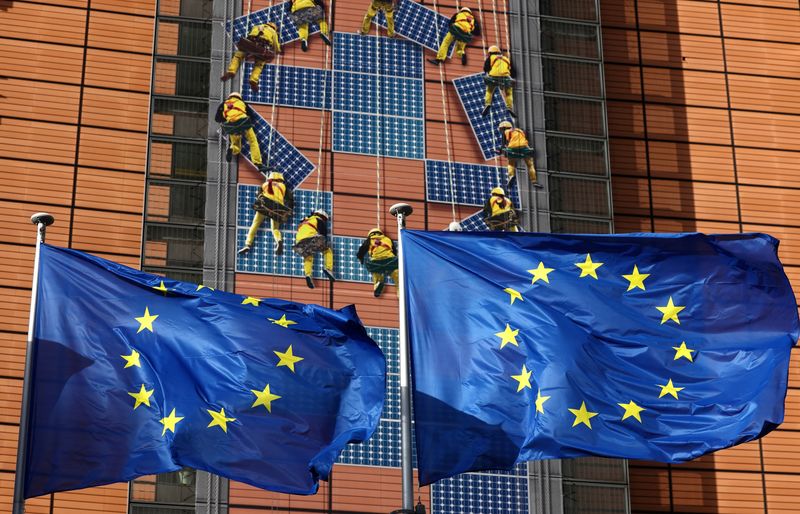By Ludwig Burger
(Reuters) -The European Union on Tuesday started to consider a proposal to ban widely used, potentially harmful substances known as PFAS or "forever chemicals" in what could become the bloc's most extensive piece of regulation of the chemical industry.
The chemicals have been used in tens of thousands of products, including cars, textiles, medical gear, wind mills and non-stick pans due to their long-term resistance to extreme temperatures and corrosion.
But PFAS have also been linked to health risks like cancer, hormonal dysfunction and a weakened immune system as well as environmental damage.
The five countries - Germany, the Netherlands, Denmark, Sweden and non-EU state Norway - which have been collaborating on the proposal said in a joint statement on Tuesday that, if passed, it would become "one of the largest bans on chemical substances ever in Europe".
"A ban on PFAS would reduce quantities of PFAS in the environment over the long term. It would also make products and processes safer for humans," they added.
Once the ban is in force, companies will be given between 18 months and 12 years to introduce alternatives to the more than 10,000 PFAS affected, depending on the availability of alternatives, according to the draft proposal.
Makers and users of PFAS, which have formed a lobby subgroup under the European chemical makers' association CEFIC, include BASF, 3M (NYSE:MMM), Bayer (ETR:BAYGN), Solvay (EBR:SOLB), Merck KGaA and Teflon maker Chemours.
"In many cases, no such alternatives currently exist, and in some they possibly never will," the five countries said in their statement, urging companies to work on substitutes.
Waterproofing agents for textiles are among the easiest to replace, with paraffin wax for instance, but no substitutes are currently available for use in some medical devices such as pace makers, the dossier showed.
The moniker "forever chemicals" stems from their ability to accumulate in water and soils because they do not decompose as a result of an extremely strong bond between carbon and fluorine atoms.
Speaking at a media briefing in Brussels, Audun Heggelund of the Norwegian Environment Agency said they are now detectable across the globe.
"You can find PFAS in penguins in the Antarctic, in polar bears in the Arctic, even in rain water in Tibet," he added.
The FPP4EU group of 14 companies that make and use PFAS said the restrictions would have a "huge impact" on many products for daily use and that the association would flag the need for certain exemptions in the public consultations.
"FPP4EU’s main concern is that the restriction proposal may still lead to disruptions of certain value chains and eventually eliminate some key applications," said Jonathan Crozier, FPP4EU's Advocacy and Communications Chairman.
The dossier showed that a certain number of pharmaceuticals, animal health products, crop protection chemicals and disinfectants would be exempt, or benefit from so-called derogations, because they already fall under even stricter existing regulatory regimes.
DIFFICULT PROCESS
Countries submitting the dossier said that once a ban is in place, accumulation in the environment will continue for many years because waste products would continue to shed the molecules.
BEUC, a European association of national consumer protection agencies, said in a statement: "We call on the EU to proceed as fast as possible with this restriction".
Within the European Chemicals Agency (ECHA), two scientific committees for Risk Assessment and for Socio-Economic Analysis will now review whether the proposal conforms with wider EU regulation of chemicals known as REACH, followed by a scientific evaluation and consultation with the industry.
ECHA has said that the two committees may need longer than the usual 12 months to conclude their evaluation.
Afterwards, the European Commission and EU member states will decide on the final version, which may come into force in 2026 or 2027, according to the dossier.
In other regions, initiatives to restrict PFAS are also underway. In August, the United States government said it will propose designating certain forever chemicals as hazardous substances under the U.S. Superfund programme.
Among corporate initiatives, U.S. industrial conglomerate 3M Co in December set itself a 2025 deadline to stop producing them.
Investors managing $8 trillion in assets in December wrote to 54 companies urging them to phase out their use.

The overall annual health costs from exposure to PFAS in Europe has been estimated to be 52 billion-84 billion euros ($55.72 billion-$90.01 billion), according to the draft.
($1 = 0.9332 euros)